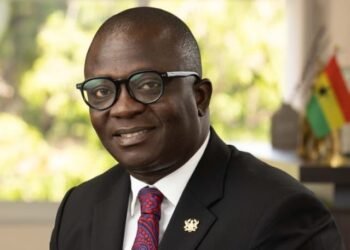The Ghana Private Road Transport Union (GPRTU), alongside other transport unions and traders in the CMB enclave, has staged a massive protest against what they describe as an attempt by private developers to seize the lorry station land in central Accra.
The protest, which began near the Ridge Roundabout and continued through key parts of the city, culminated at the Jubilee House where leaders of the unions presented a petition to President John Dramani Mahama, calling for urgent intervention.
The demonstration was organised by the Container Owners Association, the Concerned Drivers Association, and the Commercial Transport Operators, with strong participation from drivers, traders, and market women.
Samuel Amoah, Deputy Public Relations Officer of GPRTU, had earlier announced the action during a press conference in Accra on Monday, September 15. He explained that the protest was the result of years of grievances over the steady encroachment on public land reserved for transport infrastructure.
“We are pleading with President Mahama that enough is enough. We don’t want any of them (private developers) there again. None of them should step their foot on that land”
Samuel Amoah, Deputy Public Relations Officer of GPRTU

He insisted that continued encroachment risked collapsing the station and destroying the livelihoods of thousands of workers who depend on the space.
At the Jubilee House, the petition was received by Presidential Staffer Bridget Otoo, who assured the unions that their concerns would not be ignored. “We see this as very serious and will attach all the seriousness that this deserves,” Otoo stated.
She emphasised that the government would review the petition carefully and work with relevant institutions to resolve the matter.
Encroachment Displaces Station Workers
According to the unions, the encroachment has already displaced a significant number of traders and drivers who rely on the CMB lorry station for their daily operations.
Many of the affected traders, particularly women, have been forced onto the streets, worsening congestion in Accra’s central business district and raising safety risks for pedestrians and commuters.
Members of the unions stressed that the station plays a vital role in Ghana’s transport system, serving as a hub for both intra-city and inter-city travel. They warned that if the land was taken over, it would severely affect the “accessibility and affordability” of transport in the capital.

The protest created widespread traffic disruptions across the city, highlighting the critical importance of the CMB enclave to Accra’s transport network. Drivers and allied transport workers carried placards calling on the government to defend public spaces from private acquisition and to prioritise transport infrastructure in national planning.
For many of the demonstrators, the protest was not only about land but also about safeguarding their livelihoods. The traders argued that the displacement had worsened their economic conditions and exposed them to dangers of operating on crowded streets.
Amoah reiterated that the protest was a clear message to both government and private investors. “This is about protecting the lifeline of Accra’s transport system. Lorry stations cannot be sold off to private interests. They must be preserved for the public good,” he said.
Growing Tensions
The dispute over the CMB lorry station adds to growing tensions between transport unions and private developers over land use in Accra. Unions have long complained that rapid urban development is encroaching on spaces critical to Ghana’s public transport system.
While the government of the day has pledged to investigate the matter, union leaders have vowed to intensify their advocacy until firm action is taken. They argue that protecting the lorry station is essential not only for transport workers but also for the millions of commuters who depend on the hub daily.

As Accra struggles with congestion, urban expansion, and rising demand for reliable transport, the outcome of this standoff will be closely watched by both unions and private developers.
For now, the GPRTU and its allies insist they will not relent until the land is fully secured for public use.
READ ALSO: Ghana Cedi Decline, A Natural Market Adjustment- Prof. Bokpin





















